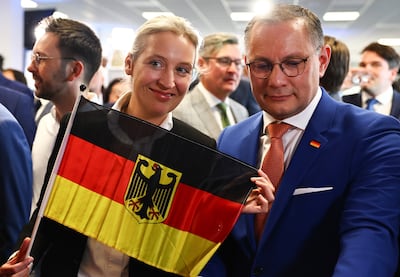French President Emmanuel Macron moved to dissolve his national parliament as far-right parties were projected to make big gains in the European elections.
Far-right parties were on course to significantly boost their presence in the EU's transnational parliament and send a message to Europe's most powerful centrist leaders.
Despite the defeats, centre-left and centre-right parties across Europe are set to preserve their overall majority.
Projected results for the European Parliament for France put the far-right National Rally (RN) party at about 33 per cent, with 31 seats in the new European Parliament – more than double the score of Mr Macron's supporters, on 15 per cent.
In Germany, the Alternative for Germany (AfD) party rose to second place with about 16 per cent, ahead of Chancellor Olaf Scholz's Social Democrats and its two ruling coalition partners.
Austria's far-right Freedom Party and the Belgian nationalists, Vlaams Belang, also did well in the European vote.
The estimates aggregated by the European Parliament are based on exit polls or other survey data, along with projections that may include some partial election returns.
About 360 million voters across 27 countries were expected to cast ballots to elect 720 members of the European Parliament.
Election results determine the bloc's next assembly and, indirectly, the make-up of the powerful European Commission, helping to shape policy over the next five years.

It is a crucial time for the EU, as the war on its eastern border between Russia and Ukraine continues, a growing US-China rivalry affects European industry and the climate emergency causes alarm.
European Commission chief Ursula von der Leyen promised on Sunday to build a "bastion against extremes" in the new EU Parliament, where vote projections show her centre-right group in first place.
Rising living costs and deteriorating standards are often blamed on rising immigration levels, leading to a surge in the popularity of the political far right.
“I’ve decided to give you back the choice of our parliamentary future through the vote," Mr Macron said in an address to the nation from the Elysee Palace.
"I am therefore dissolving the National Assembly.”

The vote will take place in two rounds on June 30 and July 7, he said.
Marine Le Pen's RN had been predicted to beat Mr Macron's liberal Renaissance party but the scale was unexpected.
In Germany, Europe’s biggest economy and most populous nation, the election dealt a blow to Chancellor Olaf Scholz, whose centre-left Social Democratic Party was polling behind the far-right AfD.
Eurosceptic Ms Le Pen is keen to team up with Italy’s far-right Prime Minister Giorgia Meloni, who opposes undocumented asylum seekers entering Europe.
But the alignment appears unlikely, due to Ms Meloni’s pro-EU position and her agreement with the general EU consensus that military and financial support for Kyiv should continue, with Ukraine being encouraged to join the bloc.

Ms von der Leyen, who is in the running for a second term in office, will be seeking to draw Ms Meloni into the fold.
The post will ultimately be decided by EU leaders but also needs a majority assent in the new European Parliament.
Mainstream leftist parties fear there could now be a sharp rightward turn – with tougher immigration laws, a watering down of climate policies to appease protesting farmers and a focus on boosting industry.
It could also bring the far right further into the mainstream, as has happened in Italy and the Netherlands where the movement dominates governing coalitions.
In the Netherlands, exit polls from Thursday already show nationalist Geert Wilders' anti-immigration party set to win seven of the 29 Dutch seats in the EU assembly, from none in 2019, following on from his victory in last year's national election.
Ms Meloni saw her position strengthened by her arch-conservative Brothers of Italy group winning the most votes, the exit polls showed.
In Belgium, voters were also holding national elections where the far-right Vlaams Belang gained ground, taking 17.5 per cent of the vote, but was second to the nationalist New Flemish Alliance, led by Bart De Wever.
The ruling liberals under Prime Minister Alexander De Croo took only 7 per cent of the vote.
Far-right populism and nationalism are already forces to be reckoned with in Poland and Spain. In Hungary, Prime Minister Viktor Orban's ruling Fidesz party has been blocking further EU aid to Ukraine.


